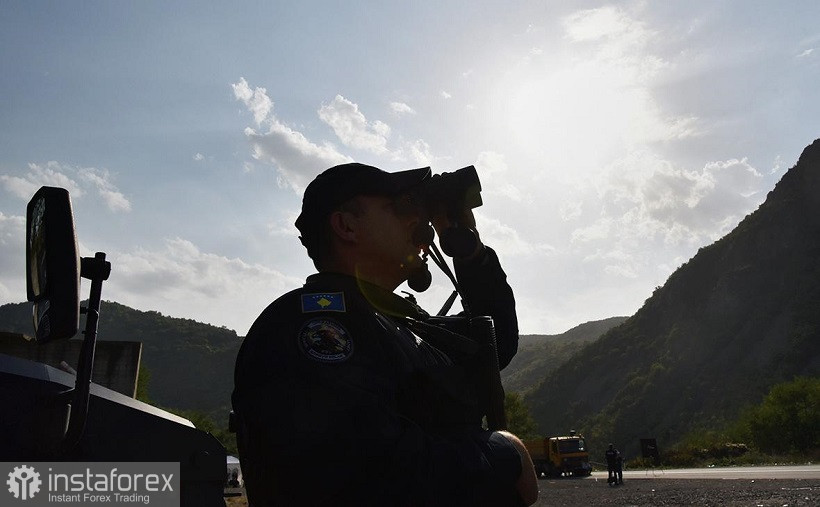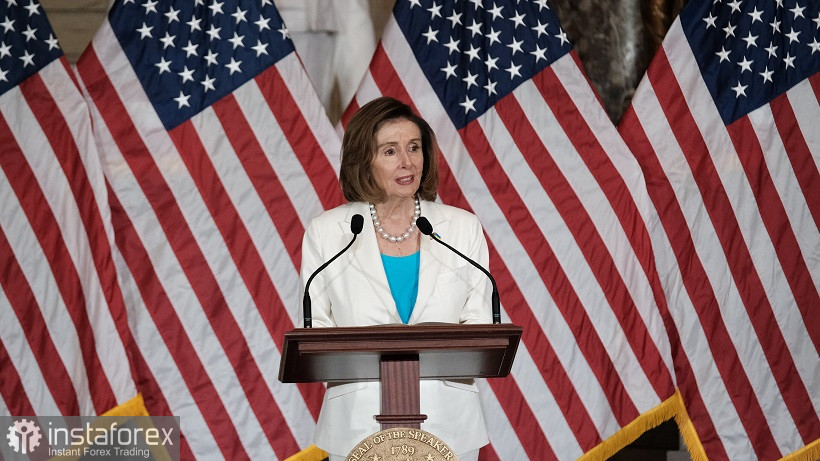The euro-dollar pair started the trading week with a corrective rise, continuing Friday's trends. Risk appetite has increased in the market, although recent geopolitical events could radically redraw the fundamental picture. However, it is too early to talk about complete de-escalation, so longs for the EUR/USD pair still look risky.

So, this weekend, new "hot spots" could appear on the political map of the world. Although the word "new" in this case does not sound quite correct: the Serbia-Kosovo tensions have a long history, and the tension around Taiwan also dates back decades. We will not delve into history—we will only consider the reasons for the escalation in the context of the prospects for the behavior of the EUR/USD pair.
Let's start with the Balkan events. Just yesterday, Pristina and Belgrade accused each other of armed aggression on the border. The situation was resolved only on Monday night, while on Sunday the parties voiced very belligerent statements, indicating their readiness to conduct military operations. The situation on the Serbian-Kosovo border escalated due to Pristina's decision to oblige Serbs to obtain a temporary border crossing document when entering the (unrecognized by many countries of the world) republic. Serbian documents in Kosovo wanted to be considered invalid from August 1. Shots and sirens were even heard on Sunday evening, and Serbian President Aleksandar Vucic warned of a possible attack by the Kosovo army on the northern part of his country on the night of August 1st.
Obviously, a war in the so-called "soft underbelly" of Europe would hit the European currency, which is already under pressure from the growing energy crisis. Therefore, the conditional "happy ending" of the next round of the Serbia-Kosovo conflict allowed the buyers of EUR/USD to organize a corrective pullback: the pair went to the upper border of the 1.0130–1.0280 range. At night it became known that the government of Kosovo postponed until September 1 the decision to terminate the Serbian documents, because of which there was a military escalation on the border with Serbia.
And if in the case of the Balkans we can confidently talk about detente (at least temporarily), then the "Taiwan case" is still on the agenda. Although yesterday the situation seemed to have been resolved. Last week, the Chinese Ministry of Defense announced that the Chinese army "will not sit idly by if US House Speaker Nancy Pelosi visits Taiwan." According to representatives of the Chinese defense establishment, the military will take measures "to prevent external interference."
On Saturday, Pelosi flew out of the US on her Asia tour—more than 100,000 people watched her flight path online. But after the plane landed in Hawaii, the pilots turned off the transponder on board, thereby increasing the intrigue regarding the further path of the speaker of the lower house of the US Congress. China, meanwhile, again sounded belligerent statements, urging Washington "not to take a fatal step." The situation noticeably escalated—panic notes began to sound in the press about the likelihood of a direct military clash between China and the United States. Against this background, the press service of Pelosi published the program of her Asian tour. Taiwan was not there: according to the plan, the speaker of the House of Representatives will visit Singapore, Malaysia, South Korea, and Japan.

It would seem that the situation is resolved, and you can safely turn this page. But today, journalists from the Taiwanese state media reported that Pelosi will still visit the capital of Taiwan, Taipei, on August 2. There is also a version that Pelosi's plane may land in Taiwan under the pretext of a breakdown or refueling.
Reacting to this information, a spokesman for the Chinese Ministry of Foreign Affairs said that due to the House Speaker's status as the "No. 3 official in the US government," her visit to Taiwan "will lead to egregious political consequences." Meanwhile, according to Japanese media, the United States is now actively pulling troops to Taiwan. According to them, the US naval forces in the South China Sea region and the nearby waters of the Pacific Ocean have large military aircraft, three submarines, two aircraft carriers, and 36 other ships. The official authorities of Taiwan, in turn, neither confirm nor deny the possibility of the speaker's visit to the island.
Thus, the existing fundamental background, on the one hand, contributes to the corrective growth of EUR/USD, primarily due to de-escalation in the Balkans. On the other hand, dollar bulls can make themselves known at any moment if Pelosi decides to visit Taiwan anyway. The situation is unsteady, so at the moment, it is advisable for the pair to take a wait-and-see position. Macroeconomic fundamentals are not working now, and the geopolitical picture is extremely unstable.
 English
English 
 Русский
Русский Bahasa Indonesia
Bahasa Indonesia Bahasa Malay
Bahasa Malay ไทย
ไทย Español
Español Deutsch
Deutsch Български
Български Français
Français Tiếng Việt
Tiếng Việt 中文
中文 বাংলা
বাংলা हिन्दी
हिन्दी Čeština
Čeština Українська
Українська Română
Română

